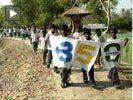
Guests
- Anna KeenanAustralian climate justice activist.
A group of international climate justice activists have entered Day 34 of a hunger strike. The strike began on November 6, the final day of the Barcelona climate talks. On Tuesday, Democracy Now! producer Mike Burke spoke with Anna Keenan, one of the hunger strikers here at the climate summit in Copenhagen. [includes rush transcript]
Transcript
AMY GOODMAN: We’re broadcasting live from the Bella Center from COP15, the climate change conference, the only daily, global TV, radio news hour that is broadcasting from inside and bringing you voices from the outside, as well.
A group of international climate justice activists have entered Day 34 of a hunger strike. The strike began on November 6, the final day of the Barcelona climate talks.
On Tuesday, Democracy Now! producer Mike Burke spoke with one of the hunger strikers here at the climate summit in Copenhagen.
ANNA KEENAN: My name is Anna Keenan. I’m from Australia, but I’ve been living in Europe for the last year. And I had my twenty-fourth birthday on day ten of the hunger strike. And now it’s day thirty-three of Climate Justice Fast, so I haven’t eaten in over a month.
And I’m undertaking this action because I feel that, as an activist for the last three or four years, I’ve done all sorts of different campaigning. I’ve written petitions. I’ve signed letters. I’ve lobbied governments. I’ve got arrested on top of a coal train in civil disobedience. And I feel like politics just is not changing fast enough, so we need to take our activism to a higher and more moral level. And that’s why I’ve decided that, inspired by Gandhi and Martin Luther King, that I’ve decided to take on this hunger strike.
MIKE BURKE: How long are you going to continue the strike?
ANNA KEENAN: We’re not yet sure under what conditions the hunger strike is going to end. It depends a lot what happens here at the negotiations over the next two weeks. The only guarantee that we can really offer is that if we see the huge shift towards climate justice that we need, if we see the political paradigm shift and the cultural paradigm shift emerging from COP15, then we will confidently conclude our hunger strike. But other than that, we’re not sure under what conditions the strike will end.
MIKE BURKE: And what does “climate justice” mean to you?
ANNA KEENAN: ”Climate justice” is a very complex term. You’ll actually see, if you have a look at the back of my neck here, I’ve got it tattooed on my neck. So, “climate justice,” to me, means a multitude of things. Basically, “justice,” to anybody, means that whoever has committed an injustice must be changed and brought to justice. So, to me, that means the end of fossil fuels. All of the companies and nations that have profited so much from using fossil fuels and from deforesting the earth over the last thirty years must be changed. You know, those practices have to end immediately.
And then, the other side of justice is that those who have been committed an injustice against must be — you know, that they have to be compensated, and that has to be made right. So, to those people who are in the most affected nations, they need to be paid compensation for adaptation. You know, they’re suffering the effects of a problem they didn’t cause, and we’ve profited from that in the developed world, so we need to be paying them very directly to compensate them. And we’re calling for at least $195 US billion per year, and that’s to cover adaptation to help them to develop in a zero carbon way and to end deforestation and to help convert agriculture into sustainable agriculture.
MIKE BURKE: And can you say a few words about how climate change has impacted Australia?
ANNA KEENAN: Absolutely. Climate change has had a horrific effect on our country already. And if it continues, it’s going to be absolutely disastrous. The Murray-Darling Basin, which is the food bowl of Australia, is where two million people make their livelihoods farming, and the rivers are drying out. The droughts are taking the water straight out of the river systems. There’s rising salinity. The farming communities who are there have seen suicide rates skyrocket, because they’re not able to financially sustain themselves anymore. And Australia could be going from being a net food producing and exporting country to needing to become a food importer.
Aside from that, we’ve seen devastating bush fires. They’re wiping out, you know, towns and communities. We’ve seen cattle dying. At the same time as we’ve seen bush fires in the south, the exact same time we’ve seen floods in the north, in Queensland, in my state. It’s insane. Like, you know, Australia has always been a country of, you know, contrasting climates, but never to the extent that we’re seeing now. And to think that this could go on, you know, and get worse over the next fifty years, you know, is a really scary prospect for me.
AMY GOODMAN: That was Australian climate activist Anna Keenean. She’s now in the thirty-fourth day of a hunger strike.













Media Options